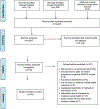Treatment of depression, anxiety, and trauma-related disorders during the perinatal period: A systematic review
- PMID: 29935979
- PMCID: PMC6637409
- DOI: 10.1016/j.cpr.2018.06.004
Treatment of depression, anxiety, and trauma-related disorders during the perinatal period: A systematic review
Abstract
Women with psychiatric disorders during pregnancy and the postpartum period (i.e., perinatal period) are at increased risk for adverse maternal and child outcomes. Effective treatment of psychiatric disorders during the perinatal period is imperative. This review summarizes the outcomes of 78 studies focused on the treatment of depression, anxiety, and trauma-related disorders during the perinatal period. The majority of studies focused on perinatal depression (n = 73). Of the five studies focused on anxiety or trauma-related disorders, only one was a randomized controlled trial (RCT). The most studied treatment was cognitive behavioral therapy (CBT; n = 22), followed by interpersonal psychotherapy (IPT; n = 13). Other interventions reviewed include other talk therapies (n = 5), collaborative care models (n = 2), complementary and alternative medicine approaches (n = 18), light therapy (n = 3), brain stimulation (n = 2), and psychopharmacological interventions (n = 13). Eleven studies focused specifically on treatment for low-income and/or minority women. Both CBT and IPT demonstrated a significant benefit over control conditions. However, findings were mixed when these interventions were examined in low-income and/or minority samples. There is some support for complementary and alternative medicine approaches (e.g., exercise). Although scarce, SSRIs demonstrated good efficacy when compared to a placebo. However, SSRIs did not outperform another active treatment condition (e.g., CBT). There is a tremendous need for more studies focused on treatment of perinatal anxiety and trauma-related disorders, as well as psychopharmacological effectiveness studies. Limitations and future directions of perinatal treatment research, particularly among low-income and/or minority populations, are discussed.
Keywords: Anxiety; Depression; Postpartum; Posttraumatic stress disorder; Pregnancy; Treatment.
Published by Elsevier Ltd.
Conflict of interest statement
Conflict of interest
All authors declare that they have no conflicts of interest.
Figures
Similar articles
-
Psychological therapies for the treatment of post-traumatic stress disorder in children and adolescents (Review).Evid Based Child Health. 2013 May;8(3):1004-116. doi: 10.1002/ebch.1916. Evid Based Child Health. 2013. PMID: 23877914 Review.
-
Interventions to treat mental disorders during pregnancy: A systematic review and multiple treatment meta-analysis.PLoS One. 2017 Mar 30;12(3):e0173397. doi: 10.1371/journal.pone.0173397. eCollection 2017. PLoS One. 2017. PMID: 28358808 Free PMC article.
-
Effectiveness of cognitive behavioural therapy-based interventions for maternal perinatal depression: a systematic review and meta-analysis.BMC Psychiatry. 2023 Mar 29;23(1):208. doi: 10.1186/s12888-023-04547-9. BMC Psychiatry. 2023. PMID: 36991389 Free PMC article.
-
Impact of childhood trauma on the outcomes of a perinatal depression trial.Depress Anxiety. 2012 Jul;29(7):563-73. doi: 10.1002/da.21929. Epub 2012 Mar 23. Depress Anxiety. 2012. PMID: 22447637 Free PMC article. Clinical Trial.
-
Brief Interpersonal Psychotherapy for depression during pregnancy in a low-income population: A randomized controlled trial.J Affect Disord. 2017 Mar 1;210:151-157. doi: 10.1016/j.jad.2016.12.029. Epub 2016 Dec 20. J Affect Disord. 2017. PMID: 28038377 Free PMC article. Clinical Trial.
Cited by
-
The effect of training and supervision on primary health care workers' competence to deliver maternal depression inclusive health education in Ibadan, Nigeria: a quasi-experimental study.BMC Health Serv Res. 2021 Nov 30;21(1):1286. doi: 10.1186/s12913-021-07208-3. BMC Health Serv Res. 2021. PMID: 34847938 Free PMC article. Clinical Trial.
-
Maternal n-3 PUFA Intake During Pregnancy and Perinatal Mental Health Problems: A Systematic Review of Recent Evidence.Curr Nutr Rep. 2023 Sep;12(3):426-438. doi: 10.1007/s13668-023-00484-x. Epub 2023 Jun 16. Curr Nutr Rep. 2023. PMID: 37322309
-
Exploring the Acceptability of Expanded Perinatal Depression Care Practices Among Women Veterans.J Gen Intern Med. 2022 Sep;37(Suppl 3):762-769. doi: 10.1007/s11606-022-07573-7. Epub 2022 Aug 30. J Gen Intern Med. 2022. PMID: 36042083 Free PMC article.
-
Non-specialist delivered psycho-social interventions for women with perinatal depression living in rural communities: A systematic review.PLOS Glob Public Health. 2024 Jul 8;4(7):e0003031. doi: 10.1371/journal.pgph.0003031. eCollection 2024. PLOS Glob Public Health. 2024. PMID: 38976687 Free PMC article.
-
Canadian Network for Mood and Anxiety Treatments 2024 Clinical Practice Guideline for the Management of Perinatal Mood, Anxiety, and Related Disorders: Guide de pratique 2024 du Canadian Network for Mood and Anxiety Treatments pour le traitement des troubles de l'humeur, des troubles anxieux et des troubles connexes périnatals.Can J Psychiatry. 2025 Jun;70(6):429-489. doi: 10.1177/07067437241303031. Epub 2025 Feb 12. Can J Psychiatry. 2025. PMID: 39936923 Free PMC article.
References
-
- Alder J, Fink N, Bitzer J, Hosli I, & Holzgreve W (2007). Depression and anxiety during pregnancy: A risk factor for obstetric, fetal and neonatal outcome? A critical review of the literature. The Journal of Maternal-Fetal and Neonatal Medicine, 20(3), 189–209. - PubMed
-
- Alvidrez J, & Azocar F (1999). Distressed women’s clinic patients: Preferences for mental health treatments and perceived obstacles. General Hospital Psychiatry, 21, 340–347. - PubMed
-
- Alwan S, Reefhuis J, Rasmussen SA, & Friedman JM (2011). Patterns of anti-depressant medication use among pregnant women in a United States population. The Journal of Clinical Pharmacology, 51(2), 264–270. - PubMed
-
- Andrade C (2017). Offspring outcomes in studies of antidepressant-treated pregnancies depend on the choice of control group. Journal of Clinical Psychiatry, 78(3), e294–e297. - PubMed
Publication types
MeSH terms
Grants and funding
LinkOut - more resources
Full Text Sources
Other Literature Sources
Medical


